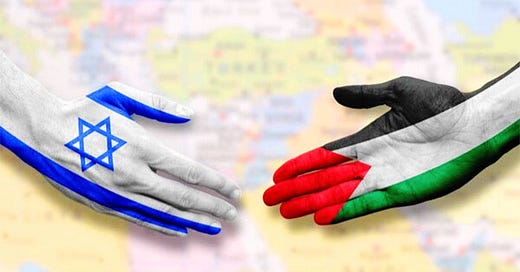Appeasement, not Victory: Israel Has Quickly Reverted to Its Bad Old Policies
Everything changed” in Israel on Oct. 7. Except it did not.
Daniel Pipes - The Washington Times - NOV 17, 2023
“Everything changed” in Israel on Oct. 7. Except it did not. Despite much talk of victory by the prime minister and survey research showing the public endorses a tough new approach, Israeli officialdom and its security establishment show signs of reverting to their old failed policies, even before the bodies have been buried.
Those failed policies mean primarily one thing: Wrongly assuming that enrichment — more work permits in Israel, a larger fishing zone, outside funding — gives Palestinians something to lose, taming them and making them less inclined to aggression.
Symptoms of that sad reversion include:
The security establishment approved the entry of 8,000 West Bank workers to Israel, mostly to do agricultural work. It did so in response to Israel‘s agriculture minister assuring his colleagues that the workers had been vetted and posed no danger. That thousands of workers from Gaza had spied on Israel and made themselves complicit in the Oct. 7 massacre seemed to be forgotten.
On the West Bank itself, Israel‘s commanding general there issued oxymoronic orders limiting Arab access that appeared tough but changed little. As the Mateh Binyamin Regional Council explained, “There is no entry into Israeli towns for Arab workers. They will be permitted to enter industrial areas at night only.” Do marauders and murderers carry out their crimes only in daylight?
The Palestinian Authority, which nominally governs part of the West Bank, not only offered full-throated support for the Hamas massacre but boasted of having a role in it. It also required mosques in its jurisdiction to instruct congregants that exterminating Jews constitutes an Islamic duty. Despite this, the Israeli Cabinet continues to send tax money to the Palestinian Authority. Israel‘s defense minister, Yoav Gallant, endorsed this decision, saying, “It is appropriate to transfer and transfer immediately, the funds to the Palestinian Authority so that they will be used by its forces who help prevent terrorism.” (That theme of enrichment never seems to die.)
National Security Minister Itamar Ben-Gvir tried to loosen the rules of engagement for police officers, permitting them in emergencies to shoot at the legs of aggressors, but Benny Gantz, a member of the War Cabinet, managed to deflect the vote, thereby keeping the more restrictive regulations in place.
Five days after Oct. 7, Israel closed its Public Diplomacy Ministry, providing a perfect symbol of Israel‘s historically hapless information efforts.
Contrarily, Israel‘s communications minister called Al Jazeera, the Qatari television channel, a “propaganda mouthpiece” that incites violence against Israel and attempted to shut down its office in Israel. The government rejected his recommendation, not wanting to upset the Qatari government, which had helped with the release of several hostages, thereby ignoring its role in perpetrating Oct. 7. Yossi Cohen, the former head of Mossad, goes further, saying he favors refraining from criticizing Qatar.
Before the massacre, Israel supplied Gaza with 49 million liters of fuel, or 9% of the territory’s daily consumption, through three pipelines. It cut all supplies after the massacre. But that lasted just 20 days, after which Israel reinstated 28.5 million liters through two pipelines. Why not all three? Because Hamas had damaged the third on Oct. 7, necessitating repairs.
Not to worry: Israel Defense Forces Col. Elad Goren announced his office had “assembled a team of experts who assess the humanitarian situation in Gaza on a daily basis.” Avigdor Lieberman, head of the Yisrael Beiteinu party, called this “simple idiocy.” Fuel supplies have also reportedly resumed.
Talk of victory did not stop negativism from quickly rearing its head. “I don’t see any kind of victory going out of this mess,” comments Fauda creator Avi Issacharoff. Orly Noy of B’Tselem cries out to her Israeli co-nationals, “I have no interest in the victory you’re offering me. … I’m ready to admit defeat.”
The principal of a public high school in Tel Aviv devoted 45 minutes to talking to three students who had come to school wrapped in Israeli flags. During the conversation, one student reported the principal pointed out that other students objected to such a display of patriotism, adding that if a large number of students came to school wrapped in Israeli flags, he would end this immediately.
I concluded a recent column by expecting that “the inflamed Israeli mood of the moment will likely fade with time, as old patterns reassert themselves and business-as-usual returns.” I was wrong in one aspect; it did not take time. Rather, at least in some respects, it occurred almost immediately.
***
Daniel Pipes (DanielPipes.org, @DanielPipes) is president of the Middle East Forum and author of the just-published Islamism vs. the West: 35 Years of Geopolitical Struggle (Wicked Son).





